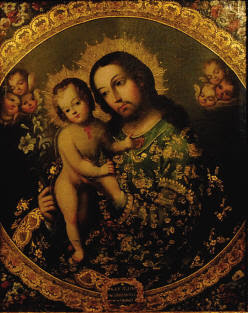
40.5 x 32.2 inches 18th Century
He also reiterated the fact that our Blessed Mother was and remained a virgin.
Picture source: Here
The following was written by Br. John and posted with permission.
J.M.J.
REMEMBER ST. JOSEPH
Husband of Mary and Guardian of Jesus
Brother John M. Samaha, S.M.
How much do we know about and appreciate the man who was the husband of the Mother of Jesus and the guardian of our Redeemer? How do we honor him? St. Joseph is often overlooked. Scripture says little of him. We seem to give him scant attention.
Yet devotion to St. Joseph has deep roots in Christian tradition.
Joseph is often the overlooked member of the Holy Family. Do you remember as children when we wrote “J.M.J.” at the top of our papers in Catholic school? We did that to remind ourselves to have the intention that Jesus, Mary, and Joseph had in life as we did our own work. We pictured the members of the Holy Family side by side.
Remember that Mary and Joseph are a couple. And Jesus is their child. They belong together. When separated, their significance in God’s plan of salvation is clouded, because their importance lies in their relationship to each other. While honoring the perpetual virginity of Mary, we cannot disregard Joseph’s privilege and happiness of being Mary’s husband. In past centuries many works of art depicted Joseph as an old man. Most likely this was done to disallow any threat to Mary’s virginity. This tended to undervalue the loving relationship of Mary and Joseph as husband and wife. Despite the tendencies of her times, St. Teresa of Avila always insisted that Joseph was a young man when he married Mary. The Divine Liturgy reinforces this positive approach regarding Joseph: “With a husband’s love he cherished Mary, the Virgin Mother of God.”
Since Joseph is the husband of Mary, he is also father to Jesus. We know that he was not the physical father of Jesus. But in the gospel account about Jesus being lost in the temple, Luke has Mary saying to Jesus: “Son, your father and I have been searching for you in sorrow.” And the Divine Liturgy testifies: “With fatherly care he watched over Jesus Christ your son, conceived by the power of the Holy Spirit.”
If one might think that Joseph’s fatherhood was not quite real or effective because he did not physically procreate Jesus, let that person speak with adoptive parents, especially those who have conceived a child of their own and adopted others. They will let you know how real Joseph’s fatherhood is.
Joseph played a very important role as Jesus “grew in wisdom, age, and grace before God and men.” In the Jewish tradition children were, until the age of five or so, in the special care and tutelage of their mothers. But beyond that age children came under the special guidance of their fathers. Joseph by duty and privilege was the rabbi of the Holy Family to teach Jesus the Jewish faith and practices. Joseph led his family in the worship of God in their home at Nazareth.
At meal times both Mary and Jesus looked to Joseph at the head of the table to offer the prayer of blessing. Each year when the great evening of the Passover was celebrated, the youngster Jesus played his role and addressed the ritual question to Joseph: Father, why is this night different from every other night? Then he listened with his Mother to Joseph’s narration of the glorious events of the Exodus and the explanation of the meaning of the paschal lamb. Later Jesus would hear John the Baptizer proclaim him, the Son of Joseph and Mary, the Lamb of God who would take away the sins of the world.
When Jesus was of age, Joseph introduced him to synagogue worship. Jesus was faithful to the synagogue rituals throughout his life. Joseph also taught Jesus the skills of a carpenter. Through the practice of this trade Jesus supported himself and his Mother after Joseph’s death.
Jesus’ human experience of fatherhood was drawn from his relationship with Joseph, his own earthly father. When Jesus said, “What father would hand his son a stone when he asks for a loaf, or a poisonous snake when he asks for a fish,” surely he had in mind how kind and gentle Joseph was to him as he was growing.
When Jesus told the parable of the prodigal son, Joseph must have been the model of that loving father. As Jesus described how the father hugged and kissed the son who had been lost, perhaps he was recalling how Joseph hugged and kissed him after he had been lost in the temple for three days.
When Jesus taught us how to pray, he began with the same loving title with which he had addressed Joseph all his life, abba.
His deep affection for Joseph is evident in the circumstances of the gospel. Joseph made a profound impression on Jesus.
Has Joseph made an impression on us? How do we think of St. Joseph, honor him, and pray to him? Do we appreciate the special place he has in Christian spirituality and in our own heritage? Let us revere wholeheartedly the husband of Mary, the foster father of Jesus, the patron of the universal Church. After all, he is the man who is closest to Christ.

No comments:
Post a Comment